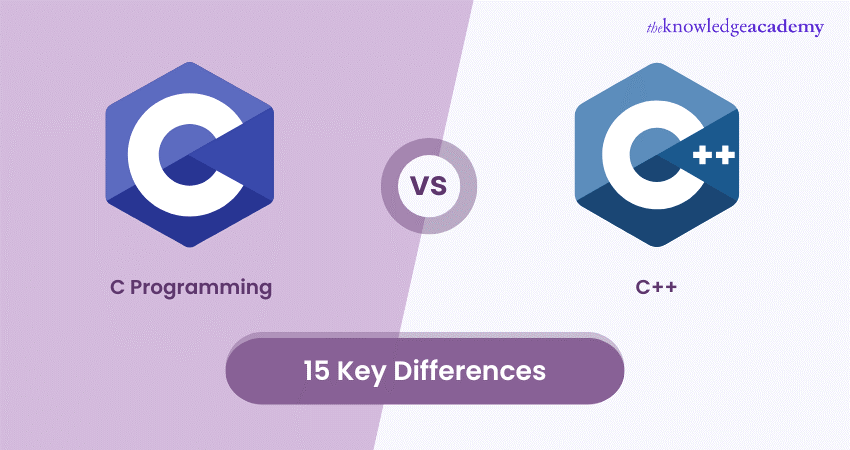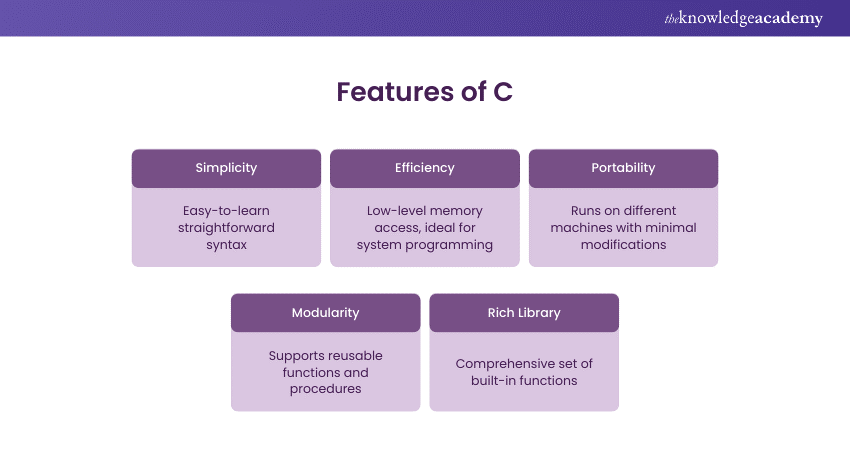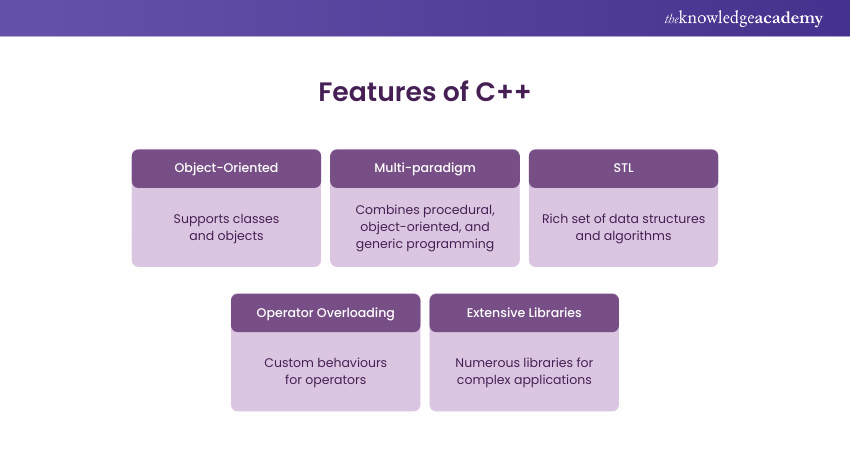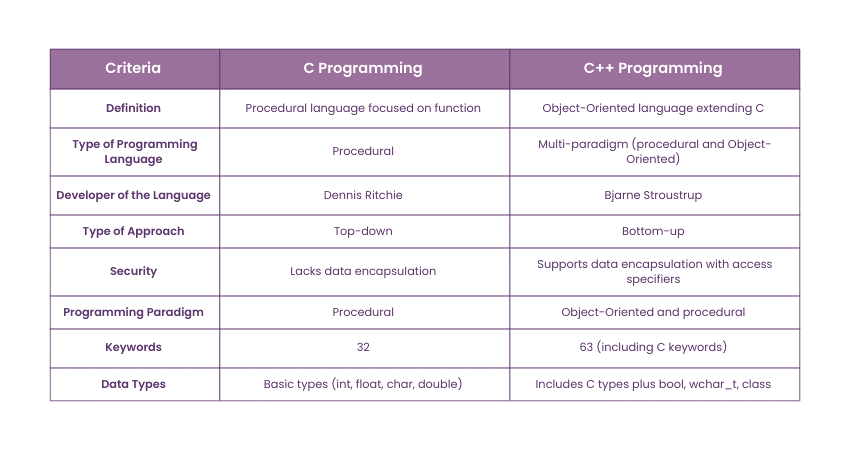We may not have the course you’re looking for. If you enquire or give us a call on + 1-866 272 8822 and speak to our training experts, we may still be able to help with your training requirements.
Training Outcomes Within Your Budget!
We ensure quality, budget-alignment, and timely delivery by our expert instructors.

Choosing the right programming language for your project can be a daunting task. One common dilemma developers face is the choice between C Programming vs C++. Both languages have distinct features and applications, making the decision even more challenging. C Programming vs C++ not only differ in their approach to solving problems but also in their use cases, efficiency, and complexity.
This blog aims to help readers make an informed decision by illustrating the key differences between C Programming vs C++. By understanding their unique characteristics and practical applications, readers can determine which language best suits their needs and career goals.
Table of Contents
1) What is C?
2) What is C++?
3) Difference between C and C++ Programming
a) Definition
b) Type of Programming Language
c) Developer of the Language
d) Type of Approach
e) Security
4) Conclusion
What is C?
C is a high-level and general-purpose programming language developed by Dennis Ritchie at Bell Labs in the early 1970s. It was designed to provide low-level access to memory and to offer a simple set of keywords.

C's efficiency and versatility have made it a popular choice for system programming, such as developing operating systems and embedded systems. It forms the foundation for many modern languages, including C++, C#, and Java.
What is C++?
C++ is an extension of the C programming language, developed by Bjarne Stroustrup in the early 1980s at Bell Labs. C++ was created to include Object-Oriented Programming features and to provide a higher level of abstraction. This enables developers to create complex applications with more ease and manageability.

C++ supports both procedural and Object-Oriented Programming paradigms, making it a versatile and powerful language for a wide range of applications, from system software to game development and real-time simulations.
Discover the power of C programming Training with our expert-led courses. Start learning and coding now!
Difference Between C Programming and C++
C and C++ are two foundational programming languages that have shaped the world of software development. While they share some similarities, they also have distinct differences that make each unique. Understanding these differences is crucial for developers to choose the right language for their projects. Here are some key distinctions between C programming and C++:

1) Definition
C is a procedural programming language focused on function and structured programming. Developed in the early 1970s by Dennis Ritchie at Bell Labs, C was designed to provide low-level access to memory while maintaining a straightforward syntax. This combination makes C highly efficient and suitable for system-level programming, such as developing operating systems, compilers, and embedded systems.
C++ is an Object-Oriented Programming language that extends C by adding classes and objects for Object-Oriented Programming. Developed by Bjarne Stroustrup in the early 1980s at Bell Labs, C++ was designed to introduce higher-level programming abstractions without sacrificing the low-level capabilities of C. This extension allows for more complex and manageable code, making C++ ideal for large-scale software development.
2) Type of Programming Language
C is a procedural or structured programming language. It follows a top-down approach where the focus is on functions and the flow of execution is directed by function calls. This procedural nature emphasises the sequence of actions to be performed.
C++ supports both procedural and Object-Oriented Programming, making it a multi-paradigm language. This flexibility allows developers to choose the most suitable programming paradigm for their projects. C++ supports procedural programming for straightforward tasks and Object-Oriented Programming for more complex applications, enhancing code organisation and reusability.
3) Developer of the Language
C was developed by Dennis Ritchie at Bell Labs. Ritchie aimed to create a language that combined the power of assembly language with the simplicity of high-level languages, leading to the creation of C. His work laid the foundation for many subsequent programming languages.
C++ was developed by Bjarne Stroustrup at Bell Labs. Stroustrup sought to enhance the C language by adding Object-Oriented features, which led to the creation of C++. His goal was to provide a language that offered both high-level abstraction and low-level control, bridging the gap between efficient system programming and complex application development.
4) Type of Approach
C uses a top-down approach to programming, where the main function is at the top, and sub-functions are called as needed. This approach starts with a high-level overview of the system and progressively breaks it down into smaller, more manageable components.
C++ uses a bottom-up approach, where classes and objects are defined first and then used to build complex programs. This approach begins with defining the fundamental building blocks (objects) and gradually integrates them into a complete system, promoting modularity and reusability.
5) Security
C does not provide built-in support for data encapsulation, making it less secure regarding data hiding and protection. In C, all data is accessible and modifiable from any part of the program, which can lead to unintentional modifications and security vulnerabilities.
C++ supports data encapsulation through classes and access specifiers (private, protected, and public), enhancing security by protecting data from unauthorised access. This encapsulation ensures that data can only be accessed and modified through defined interfaces, promoting better data integrity and security.
Master the fundamentals of coding—Join our C Programming Course today and start your journey to becoming a proficient programmer!
6) Programming Paradigm
C follows a procedural programming paradigm, focusing on functions and sequences of commands. The emphasis is on the steps to be performed, and the program is structured around functions that carry out these steps.
C++ follows an Object-Oriented Programming paradigm, emphasising objects, classes, and inheritance. It also supports procedural programming. This dual paradigm allows for greater flexibility in designing software, enabling the use of objects to model real-world entities and relationships, while also supporting procedural programming for simpler tasks.
7) Keywords
C has 32 keywords, including int, return, for, while, if, else, and switch. These keywords form the core syntax of the language, providing the basic constructs for defining variables, controlling flow, and performing operations.
C++ has 63 keywords, including all C keywords and additional ones like class, public, private, namespace, template, and virtual. These additional keywords support the Object-Oriented features and other enhancements introduced in C++, expanding the language's capabilities and flexibility.
8) Data Types
C supports basic data types such as int, float, char, and double. These fundamental data types are used to define variables and structures in C, providing the basic building blocks for data manipulation.
C++ supports all C data types and introduces additional data types like bool, wchar_t, and user-defined types like class and Enum. These additional types enable more expressive and flexible data definitions, supporting advanced programming concepts like Object-Oriented design and type safety.
9) File Extension
C source files use the .c file extension. This extension indicates that the file contains C source code, which is compiled using a C compiler.
C++ source files use the .cpp, .cc, or .cxx file extensions. These extensions indicate that the file contains C++ source code, which is compiled using a C++ compiler. The different extensions reflect historical and stylistic preferences in different development environments.
10) Header File
Common header files in C include stdio.h for standard input/output functions and stdlib.h for standard library functions. These headers provide essential functions for performing basic operations like reading and writing data, memory allocation, and process control.
Common header files in C++ include iostream for input/output stream objects and cstdlib for standard library functions. C++ also uses the Standard Template Library (STL) headers like vector, map, and algorithm. These headers provide a rich set of classes and functions for managing data structures, performing algorithms, and handling input/output operations in an Object-Oriented manner.
Take your coding skills to the next level—Register for our C++ Programming Course today and start building powerful applications!
11) Allocation and Deallocation of Memory
C uses functions like malloc(), calloc(), realloc(), and free() for dynamic memory allocation and deallocation. These functions provide a procedural approach to managing memory, requiring explicit allocation and deallocation by the programmer.
C++ uses operators new and delete for dynamic memory allocation and deallocation, providing a more intuitive and Object-Oriented approach. The new operator allocates memory and calls the constructor for object initialisation, while the delete operator deallocates memory and calls the destructor for cleanup. This approach simplifies memory management and reduces the risk of memory leaks and other errors.
12) Inheritance
C does not support inheritance as it is a feature of Object-Oriented Programming. In C, code reuse is typically achieved through function calls and modular design, but there is no built-in mechanism for creating hierarchical relationships between data structures.
C++ supports inheritance, allowing classes to inherit properties and behaviours from other classes, promoting code reuse and extensibility. Inheritance enables the creation of complex class hierarchies, where derived classes extend and specialise the functionality of base classes, facilitating the design of flexible and maintainable software systems.
13) Access Modifiers
C does not have access modifiers. All data and functions are accessible from any part of the program, which can lead to unintentional modifications and limited control over data visibility.
C++ includes access modifiers such as private, protected, and public, which control the accessibility of class members. These access specifiers provide fine-grained control over data visibility and modification, promoting better encapsulation and data integrity. Private members are accessible only within the class, protected members are accessible within the class and derived classes, and public members are accessible from anywhere in the program.
14) Function for Input/Output
C uses functions like printf() and scanf() for input and output operations. These functions are part of the standard input/output library and provide a straightforward way to read and write data. However, they are not type-safe and can be prone to errors if not used carefully.
C++ uses stream objects like cin and cout for input and output operations, providing a more type-safe and extensible approach. These stream objects are part of the iostream library and support a wide range of input and output operations with better type checking and error handling. The stream-based approach also allows for easy chaining of operations and customisation through overloading and manipulation functions.
15) Primary Focus
C focuses on function-driven programming and procedures. The emphasis is on defining functions that perform specific tasks and organising the program flow through function calls and control statements.
C++ focuses on Object-Oriented Programming, emphasising objects and classes to model real-world entities and relationships. The primary focus is on defining classes that encapsulate data and behaviour, using inheritance and polymorphism to create flexible and reusable code. This Object-Oriented approach facilitates the design of complex software systems with clear structure and modularity.
Transform your career—join our C# and .NET Training today and master the skills needed to build robust applications!
Conclusion
Understanding C programming vs C++ highlights their distinct strengths: C is ideal for system-level and embedded programming due to its simplicity and efficiency, while C++ excels in complex applications with its Object-Oriented features. Mastering both enhances programming skills and broadens software development opportunities.
Frequently Asked Questions

C++ is not inherently better than C; each has its strengths. C++ offers Object-Oriented features and supports complex applications, while C is simpler and highly efficient for system-level programming and embedded systems.

Learning C first can provide a strong foundation in programming fundamentals and memory management, making it easier to understand C++ later. However, starting with C++ is also viable due to its broader applications and modern programming practices.

C++ excels in fields requiring complex software development, such as game development, real-time simulations, and large-scale applications, thanks to its Object-Oriented features and performance efficiency.

The Knowledge Academy takes global learning to new heights, offering over 30,000 online courses across 490+ locations in 220 countries. This expansive reach ensures accessibility and convenience for learners worldwide.
Alongside our diverse Online Course Catalogue, encompassing 17 major categories, we go the extra mile by providing a plethora of free educational Online Resources like News updates, Blogs, videos, webinars, and interview questions. Tailoring learning experiences further, professionals can maximise value with customisable Course Bundles of TKA.

The Knowledge Academy’s Knowledge Pass, a prepaid voucher, adds another layer of flexibility, allowing course bookings over a 12-month period. Join us on a journey where education knows no bounds.

The Knowledge Academy offers various C Programming Courses, including the C# Programming Course, C Programming Course and the C++ Programming Training. These courses cater to different skill levels, providing comprehensive insights into C vs Java.
Our Programming and DevOps Blogs cover a range of topics related to C Programming, offering valuable resources, best practices, and industry insights. Whether you are a beginner or looking to advance your Programming skills, The Knowledge Academy's diverse courses and informative blogs have got you covered.







 Top Rated Course
Top Rated Course




 If you wish to make any changes to your course, please
If you wish to make any changes to your course, please


